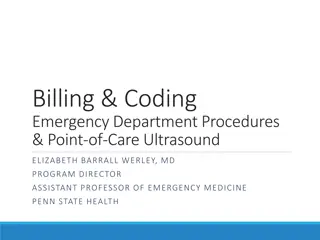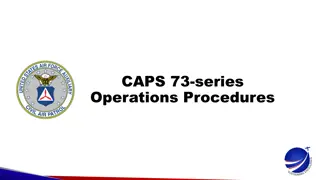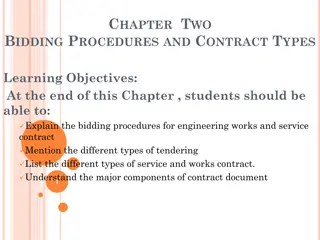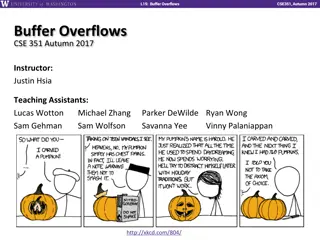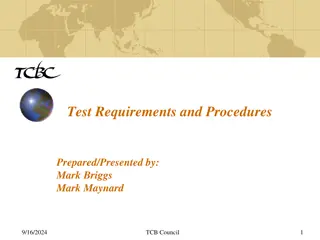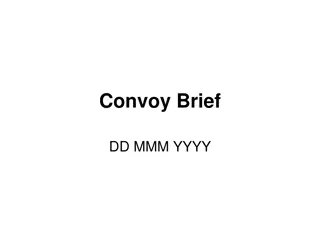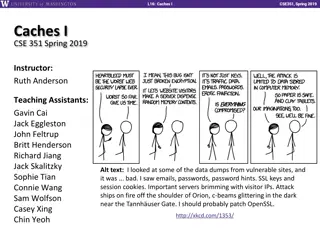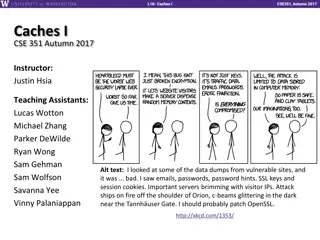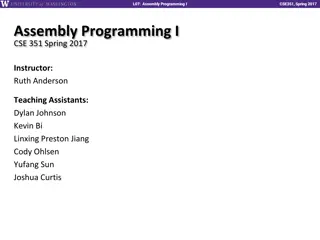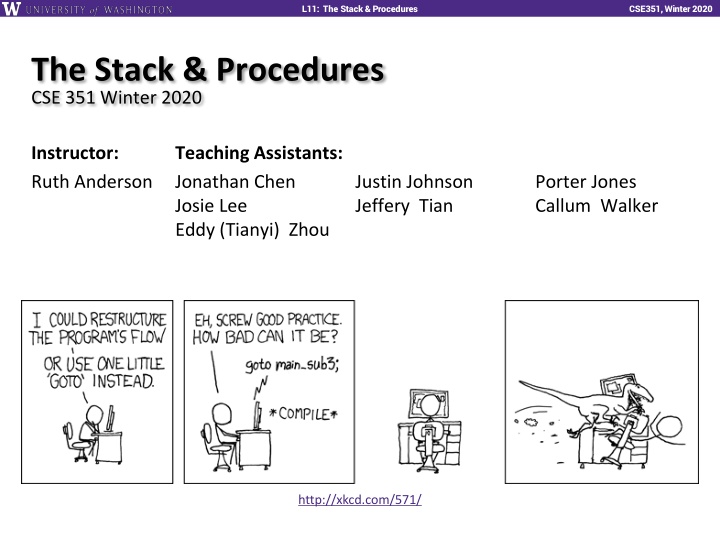
Procedures and the Stack in CSE351 Winter 2020
Explore the concepts of procedures, stacks, memory management, and calling conventions in CSE351 Winter 2020, focusing on x86 assembly, Java vs. C, and memory layout in a simplified address space.
Download Presentation

Please find below an Image/Link to download the presentation.
The content on the website is provided AS IS for your information and personal use only. It may not be sold, licensed, or shared on other websites without obtaining consent from the author. If you encounter any issues during the download, it is possible that the publisher has removed the file from their server.
You are allowed to download the files provided on this website for personal or commercial use, subject to the condition that they are used lawfully. All files are the property of their respective owners.
The content on the website is provided AS IS for your information and personal use only. It may not be sold, licensed, or shared on other websites without obtaining consent from the author.
E N D
Presentation Transcript
L11: The Stack & Procedures CSE351, Winter 2020 The Stack & Procedures CSE 351 Winter 2020 Instructor: Ruth Anderson Teaching Assistants: Jonathan Chen Josie Lee Eddy (Tianyi) Zhou Justin Johnson Jeffery Tian Porter Jones Callum Walker http://xkcd.com/571/
L11: The Stack & Procedures CSE351, Winter 2020 Administrivia Lab 2 due next Friday (2/07) Ideally want to finish well before the midterm Optional GDB Tutorial homework on Gradescope Midterm: 2/10, during lecture You will be provided a fresh reference sheet Find a study group! Look at past exams! 2
L11: The Stack & Procedures CSE351, Winter 2020 Roadmap C: Memory & data Integers & floats x86 assembly Procedures & stacks Executables Arrays & structs Memory & caches Processes Virtual memory Memory allocation Java vs. C Java: Car c = new Car(); c.setMiles(100); c.setGals(17); float mpg = c.getMPG(); car *c = malloc(sizeof(car)); c->miles = 100; c->gals = 17; float mpg = get_mpg(c); free(c); Assembly language: get_mpg: pushq %rbp movq %rsp, %rbp ... popq %rbp ret OS: Machine code: 0111010000011000 100011010000010000000010 1000100111000010 110000011111101000011111 Computer system: 3
L11: The Stack & Procedures CSE351, Winter 2020 Mechanisms required for procedures P( ) { y = Q(x); print(y) } 1) Passing control To beginning of procedure code Back to return point 2) Passing data Procedure arguments Return value 3) Memory management Allocate during procedure execution Deallocate upon return int Q(int i) { int t = 3*i; int v[10]; return v[t]; } All implemented with machine instructions! An x86-64 procedure uses only those mechanisms required for that procedure 4
L11: The Stack & Procedures CSE351, Winter 2020 Procedures Stack Structure Calling Conventions Passing control Passing data Managing local data Register Saving Conventions Illustration of Recursion 5
L11: The Stack & Procedures CSE351, Winter 2020 Simplified Memory Layout Address Space: What Goes Here: High 0xF F Addresses local variables and procedure context Stack Dynamic Data (Heap) variables allocated with new or malloc Memory Addresses static variables (including global variables) Static Data large literals/constants (e.g. example ) Literals Instructions program code Low 0x0 0 Addresses 6
L11: The Stack & Procedures CSE351, Winter 2020 Memory Management Address Space: Who s Responsible: High 0xF F Addresses Managed automatically (by compiler/assembly) Stack Dynamic Data (Heap) Managed dynamically (by programmer) Memory Addresses Managed statically (initialized when process starts) Static Data Managed statically (initialized when process starts) Literals Managed statically (initialized when process starts) Instructions Low 0x0 0 Addresses 7
L11: The Stack & Procedures CSE351, Winter 2020 Memory Permissions Address Space: Permissions: High 0xF F Addresses Stack writable; not executable Dynamic Data (Heap) writable; not executable Memory Addresses Static Data writable; not executable Literals read-only; not executable Instructions read-only; executable Low 0x0 0 Addresses Segmentation faults? 8
L11: The Stack & Procedures CSE351, Winter 2020 x86-64 Stack High Addresses Stack Bottom Region of memory managed with stack discipline Grows toward lower addresses Customarily shown upside-down Increasing Addresses Register %rsp contains lowest stack address %rsp = address of top element, the most-recently-pushed item that is not- yet-popped Stack Pointer: %rsp Stack Grows Down Stack Top Low Addresses 0x00 00 9
L11: The Stack & Procedures CSE351, Winter 2020 x86-64 Stack: Push High Addresses Stack Bottom pushq src Fetch operand at src Increasing Addresses Src can be reg, memory, immediate Decrement%rsp by 8 Store value at address given by %rsp Example: pushq %rcx Adjust %rsp and store contents of %rcx on the stack Stack Pointer: %rsp Stack Grows Down -8 Low Addresses 0x00 00 Stack Top 10
L11: The Stack & Procedures CSE351, Winter 2020 x86-64 Stack: Pop High Addresses Stack Bottom popq dst Load value at address given by %rsp Store value at dst Increment%rsp by 8 Increasing Addresses Example: popq %rcx Stores contents of top of stack into %rcx and adjust %rsp Stack Grows Down +8 Stack Pointer: %rsp Stack Top Low Addresses 0x00 00 Those bits are still there; we re just not using them. 11
L11: The Stack & Procedures CSE351, Winter 2020 Procedures Stack Structure Calling Conventions Passing control Passing data Managing local data Register Saving Conventions Illustration of Recursion 12
L11: The Stack & Procedures CSE351, Winter 2020 Procedure Call Overview Caller procedures Callee <set up args> call <clean up args> <find return val> <create local vars> <set up return val> <destroy local vars> ret Callee must know where to find args Callee must know where to find return address Caller must know where to find return value Caller and Callee run on same CPU, so use the same registers How do we deal with register reuse? Unneeded steps can be skipped (e.g. no arguments) 13
L11: The Stack & Procedures CSE351, Winter 2020 Procedure Call Overview Caller Callee <save regs> <set up args> call <clean up args> <restore regs> <find return val> <save regs> <create local vars> <set up return val> <destroy local vars> <restore regs> ret The convention of where to leave/find things is called the calling convention (or procedure call linkage) Details vary between systems We will see the convention for x86-64/Linux in detail What could happen if our program didn t follow these conventions? 14
L11: The Stack & Procedures CSE351, Winter 2020 Code Example (Preview) void multstore (long x, long y, long *dest) { long t = mult2(x, y); *dest = t; } Compiler Explorer: https://godbolt.org/z/nQ6KbZ 0000000000400540 <multstore>: 400540: push 400541: movq 400544: call 400549: movq 40054c: pop 40054d: ret# Return %rbx # Save %rbx %rdx,%rbx # Save dest 400550 <mult2> # mult2(x,y) %rax,(%rbx) # Save at dest %rbx # Restore %rbx long mult2 (long a, long b) { long s = a * b; return s; } 0000000000400550 <mult2>: 400550: movq 400553: imulq 400557: ret # Return %rdi,%rax # a %rsi,%rax # a * b 15
L11: The Stack & Procedures CSE351, Winter 2020 Procedure Control Flow Use stack to support procedure call and return Procedure call: call label 1) Push return address on stack (why? which address?) 2) Jump to label 16
L11: The Stack & Procedures CSE351, Winter 2020 Procedure Control Flow Use stack to support procedure call and return Procedure call: call label 1) Push return address on stack (why? which address?) 2) Jump to label Return address: Address of instruction immediately after call instruction Example from disassembly: 400544: callq 400550 <mult2> 400549: movq %rax,(%rbx) Return address = 0x400549 Procedure return: ret 1) Pop return address from stack 2) Jump to address 400544: call 400550 <mult2> 400549: movq %rax,(%rbx) next instruction happens to be a move, but could be anything 17
L11: The Stack & Procedures CSE351, Winter 2020 Procedure Call Example (step 1) 0000000000400540 <multstore>: 400544: call 400549: movq 0x130 400550 <mult2> %rax,(%rbx) 0x128 0x120 %rsp 0x120 0000000000400550 <mult2>: 400550: movq 400557: ret %rdi,%rax %rip 0x400544 18
L11: The Stack & Procedures CSE351, Winter 2020 Procedure Call Example (step 2) 0000000000400540 <multstore>: 400544: call 400549: movq 0x130 400550 <mult2> %rax,(%rbx) 0x128 0x120 0x118 0x400549 %rsp 0x118 0000000000400550 <mult2>: 400550: movq 400557: ret %rdi,%rax %rip 0x400550 19
L11: The Stack & Procedures CSE351, Winter 2020 Procedure Return Example (step 1) 0000000000400540 <multstore>: 400544: call 400549: movq 0x130 400550 <mult2> %rax,(%rbx) 0x128 0x120 0x118 0x400549 %rsp 0x118 0000000000400550 <mult2>: 400550: movq 400557: ret %rdi,%rax %rip 0x400557 20
L11: The Stack & Procedures CSE351, Winter 2020 Procedure Return Example (step 2) 0000000000400540 <multstore>: 400544: call 400549: movq 0x130 400550 <mult2> %rax,(%rbx) 0x128 0x120 %rsp 0x120 0000000000400550 <mult2>: 400550: movq 400557: ret %rdi,%rax %rip 0x400549 21
L11: The Stack & Procedures CSE351, Winter 2020 Procedures Stack Structure Calling Conventions Passing control Passing data Managing local data Register Saving Conventions Illustration of Recursion 22
L11: The Stack & Procedures CSE351, Winter 2020 Procedure Data Flow Registers (NOT in Memory) Stack (Memory) High Addresses First 6 arguments %rdi Diane s %rsi Silk Arg n %rdx Dress %rcx Costs %r8 $8 9 Arg 8 %r9 Arg 7 Low Addresses 0x00 00 Return value %rax Only allocate stack space when needed 23
L11: The Stack & Procedures CSE351, Winter 2020 x86-64 Return Values By convention, values returned by procedures are placed in %rax Choice of %rax is arbitrary 1)Caller must make sure to save the contents of %rax before calling a callee that returns a value Part of register-saving convention 2)Callee places return value into %rax Any type that can fit in 8 bytes integer, float, pointer, etc. For return values greater than 8 bytes, best to return a pointer to them 3)Upon return, caller finds the return value in %rax 24
L11: The Stack & Procedures CSE351, Winter 2020 Data Flow Examples void multstore (long x, long y, long *dest) { long t = mult2(x, y); *dest = t; } 0000000000400540 <multstore>: # x in %rdi, y in %rsi, dest in %rdx 400541: movq %rdx,%rbx # Save dest 400544: call 400550 <mult2> # mult2(x,y) # t in %rax 400549: movq %rax,(%rbx) # Save at dest long mult2 (long a, long b) { long s = a * b; return s; } 0000000000400550 <mult2>: # a in %rdi, b in %rsi 400550: movq 400553: imulq # s in %rax 400557: ret # Return %rdi,%rax # a %rsi,%rax # a * b 25
L11: The Stack & Procedures CSE351, Winter 2020 Procedures Stack Structure Calling Conventions Passing control Passing data Managing local data Register Saving Conventions Illustration of Recursion 26
L11: The Stack & Procedures CSE351, Winter 2020 Stack-Based Languages Languages that support recursion e.g. C, Java, most modern languages Code must be re-entrant Multiple simultaneous instantiations of single procedure Need some place to store state of each instantiation Arguments, local variables, return address Stack allocated in frames State for a single procedure instantiation Stack discipline State for a given procedure needed for a limited time Starting from when it is called to when it returns Callee always returns before caller does 27
L11: The Stack & Procedures CSE351, Winter 2020 Call Chain Example Example Call Chain whoa( ) { who(); } whoa who( ) { amI(); amI(); } who amI amI amI( ) { amI if( ){ amI() } } amI Procedure amI is recursive (calls itself) 28
L11: The Stack & Procedures CSE351, Winter 2020 1) Call to yoo Stack whoa whoa( ) { who(); } who %rbp whoa amI amI %rsp amI amI 29
L11: The Stack & Procedures CSE351, Winter 2020 2) Call to who Stack whoa whoa( ) { who(); } } who( ) { amI(); amI(); who whoa amI amI %rbp who amI %rsp amI 30
L11: The Stack & Procedures CSE351, Winter 2020 3) Call to amI (1) Stack whoa whoa( ) { who(); } } who( ) { amI(); amI(); } who amI( ) { whoa amI amI if(){ amI() who amI %rbp } amI1 amI %rsp 31
L11: The Stack & Procedures CSE351, Winter 2020 4) Recursive call to amI (2) Stack whoa whoa( ) { who(); } } who( ) { amI(); amI(); } who amI( ) { amI( ) { whoa amI amI if(){ amI() if(){ who amI amI() } } amI1 amI } %rbp amI2 %rsp 32
L11: The Stack & Procedures CSE351, Winter 2020 5) (another) Recursive call to amI (3) Stack whoa whoa( ) { who(); } } who( ) { amI(); amI(); } who amI( ) { amI( ) { whoa amI amI amI( ) { if(){ amI() if(){ who amI amI() if(){ amI() } } } } amI1 amI } amI2 %rbp amI3 %rsp 33
L11: The Stack & Procedures CSE351, Winter 2020 6) Return from (another) recursive call to amI Stack whoa whoa( ) { who(); } } who( ) { amI(); amI(); } who amI( ) { amI( ) { whoa amI amI if(){ amI() if(){ who amI amI() } } amI1 amI } %rbp amI2 %rsp 34
L11: The Stack & Procedures CSE351, Winter 2020 7) Return from recursive call to amI Stack whoa whoa( ) { who(); } } who( ) { amI(); amI(); } who amI( ) { whoa amI amI if(){ amI() who amI %rbp } amI1 amI %rsp 35
L11: The Stack & Procedures CSE351, Winter 2020 8) Return from call to amI Stack whoa whoa( ) { who(); } } who( ) { amI(); amI(); who whoa amI amI %rbp who amI %rsp amI 36
L11: The Stack & Procedures CSE351, Winter 2020 9) (second) Call to amI (4) Stack whoa whoa( ) { who(); } } who( ) { amI(); amI(); } who amI( ) { whoa amI amI if(){ amI() who amI %rbp } amI4 amI %rsp 37
L11: The Stack & Procedures CSE351, Winter 2020 10) Return from (second) call to amI Stack whoa whoa( ) { who(); } } who( ) { amI(); amI(); who whoa amI amI %rbp who amI %rsp amI 38
L11: The Stack & Procedures CSE351, Winter 2020 11) Return from call to who Stack whoa whoa( ) { who(); } who %rbp whoa amI amI %rsp amI amI 39
L11: The Stack & Procedures CSE351, Winter 2020 Vote only on 3rd question at http://pollev.com/rea Polling Question Answer the following questions about when main() is run (assume x and y stored on the Stack): int main() { int i, x = 0; for(i = 0; i < 3; i++) x = randSum(x); printf("x = %d\n",x); return 0; } int randSum(int n) { int y = rand() % 20; return n + y; } Higher/larger address: x or y? How many total stack frames are created? What is the maximum depth (# of frames) of the Stack? A. 1 B. 2 C. 3 D. 4 40
L11: The Stack & Procedures CSE351, Winter 2020 x86-64/Linux Stack Frame Caller s Stack Frame Extra arguments (if > 6 args) for this call Caller Frame Current/Callee Stack Frame Return address Pushed by call instruction Old frame pointer (optional) Saved register context (when reusing registers) Local variables (If can t be kept in registers) Argument build area (If callee needs to call another function - parameters for function about to call, if needed) Arguments 7+ Return Addr Old %rbp Frame pointer %rbp (Optional) Saved Registers + Local Variables Argument Build (Optional) Stack pointer %rsp 41


